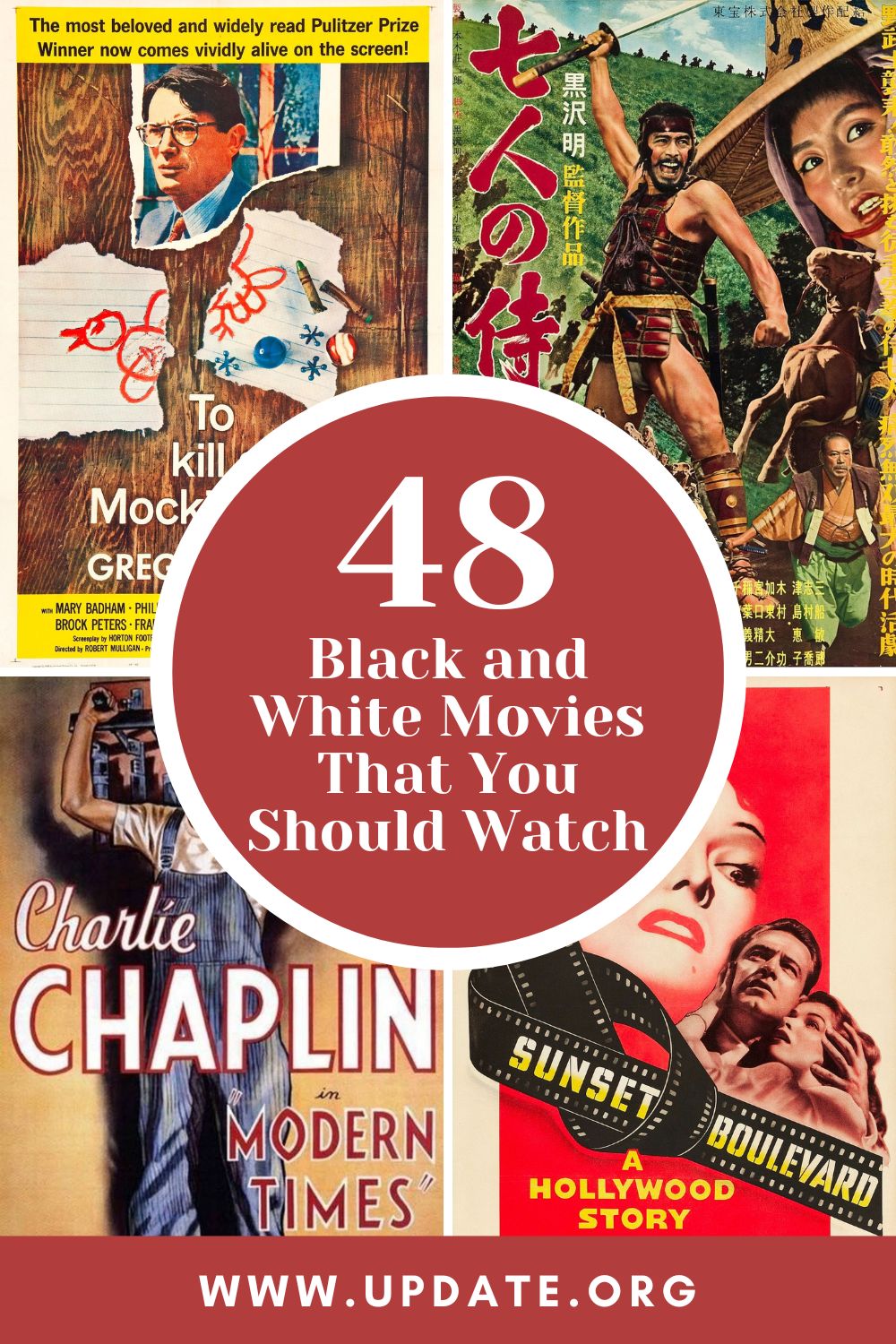Black and white cinematography has a unique ability to capture the essence of a movie. From pioneering masterpieces that shaped contemporary cinema to lesser-known gems worth a closer look, these black and white films highlight the art form in its purest form.
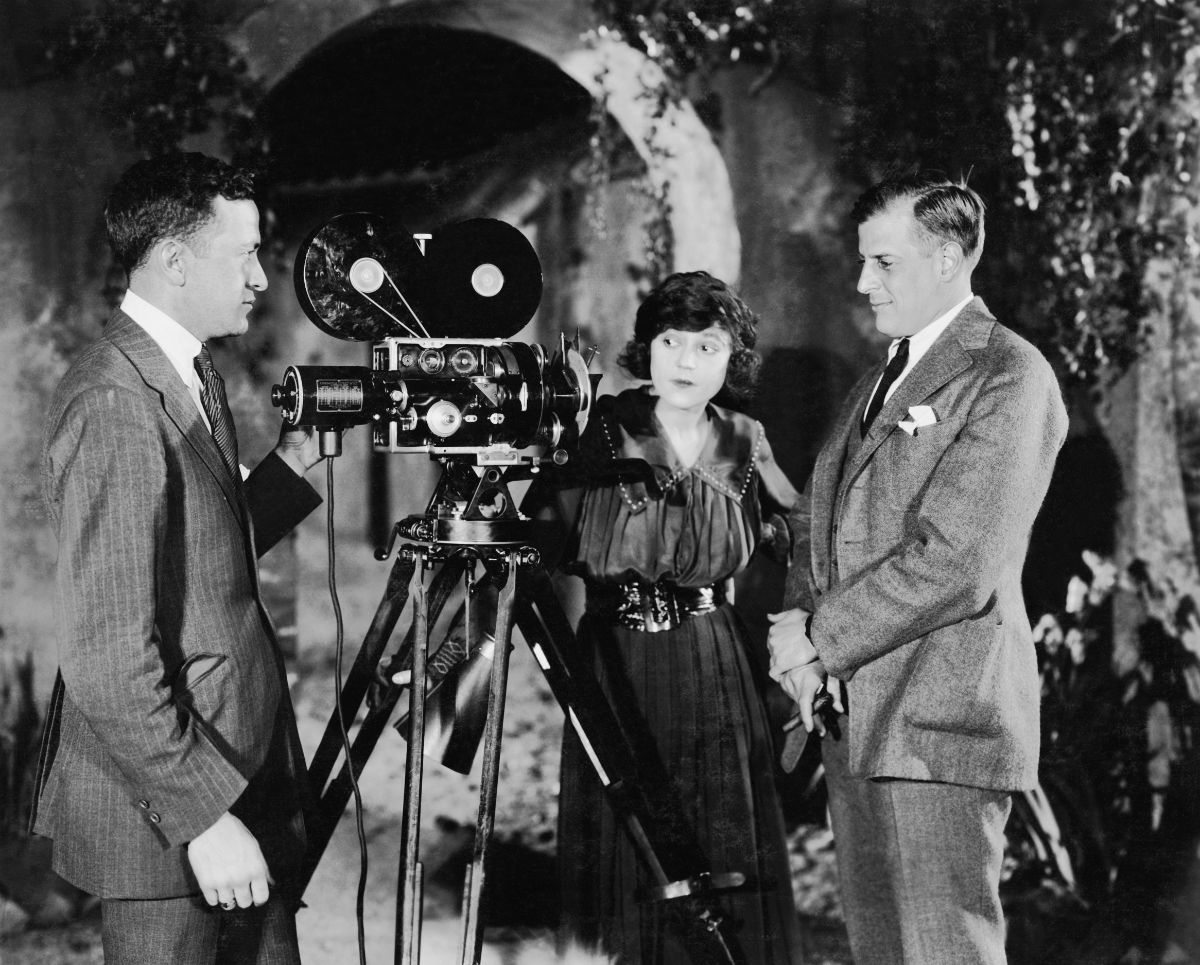
Each movie on this list is a testament to the enduring charm of monochromatic storytelling. From the golden era of Hollywood to international gems, these 48 black and white movies showcase the artistry and storytelling prowess that transcend the absence of color.
Jump to:
- 1. Seven Samurai (1954)
- 2. Double Indemnity (1944)
- 3. Twelve Angry Men (1957)
- 4. Young Frankenstein (1974)
- 5. To Kill a Mockingbird (1962)
- 6. Dr. Strangelove (1964)
- 7. Arsenic and Old Lace (1944)
- 8. Psycho (1960)
- 9. Some Like It Hot (1959)
- 10. Harvey (1950)
- 11. All About Eve (1950)
- 12. Roman Holiday (1953)
- 13. Bringing Up Baby (1938)
- 14. The Night of the Hunter (1955)
- 15. Sunset Boulevard (1950)
- 16. Gaslight (1944)
- 17. The Day The Earth Stood Still (1951)
- 18. Casablanca (1942)
- 19. Metropolis (1927)
- 20. Modern Times (1936)
- 21. Schindler’s List (1993)
- 22. Clerks (1994)
- 23. It’s a Wonderful Life (1946)
- 24. Night of the Living Dead (1968)
- 25. The Artist (2011)
- 26. The Maltese Falcon (1941)
- 27. To Have and Have Not (1944)
- 28. Singin' in the Rain (1952)
- 29. The Apartment (1960)
- 30. Citizen Kane (1941)
- 31. Paper Moon (1973)
- 32. The Great Dictator (1940)
- 33. All Quiet on the Western Front (1930)
- 34. Philadelphia Story (1940)
- 35. The Elephant Man (1980)
- 36. Gojira (1954)
- 37. Nosferatu (1922)
- 38. Grapes of Wrath (1940)
- 39. It Happened One Night (1934)
- 40. Duck Soup (1933)
- 41. La Haine (1995)
- 42. Mr. Smith Goes to Washington (1939)
- 43. The Seventh Seal (1957)
- 44. The Lighthouse (2019)
- 45. Roma (2018)
- 46. The Tragedy of Macbeth (2021)
- 47. Belfast (2021)
- 48. Sin City (2005)
1. Seven Samurai (1954)
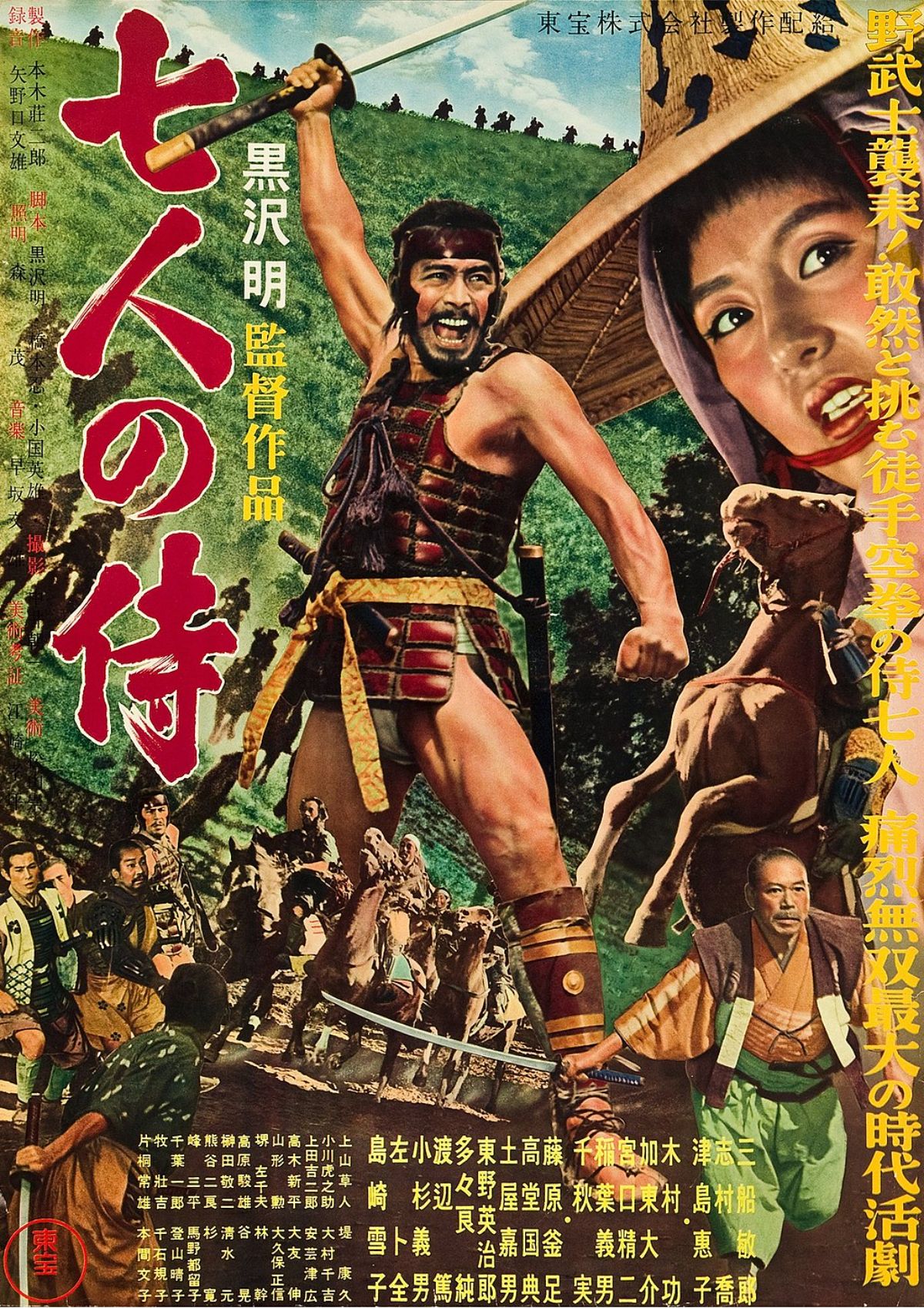
In the epic masterpiece Seven Samurai, directed by the legendary Akira Kurosawa, you are transported to a feudal Japanese village under the threat of bandit attacks. To protect their home, the villagers hire seven skilled and diverse samurai warriors.
The film brilliantly weaves a tale of honor and sacrifice. Kurosawa's meticulous storytelling and captivating cinematography make Seven Samurai not just a classic action film but a profound exploration of humanity and duty.
2. Double Indemnity (1944)
This gripping 1944 classic, which Billy Wilder directed, follows the plot of an insurance salesman named Walter Neff and the alluring Phyllis Dietrichson as they plan to commit the ideal murder. As the plot unfolds, the tension rises, leading to a gripping exploration of deception, betrayal, and the consequences of a deadly plan gone awry.
The film's narrative twists and turns, coupled with its sharp dialogue and intense performances, make it a timeless noir masterpiece. You will be on the edge of your seat as the plot develops because of the sinister allure of crime and deception.
3. Twelve Angry Men (1957)
Following a murder trial, twelve jurors deliberate the guilt or innocence of a young man. What ensues is a powerful exploration of justice, prejudice, and the human condition.
Sidney Lumet's skillful direction turns a seemingly mundane setting into a pressure cooker of emotion and moral introspection. As the jurors clash and opinions evolve, Twelve Angry Men becomes a riveting study of the complexities of truth and the pursuit of justice.
4. Young Frankenstein (1974)
This 1974 comedy pays homage to the classic Universal monster movies while adding a generous dose of humor. Follow Dr. Frederick Frankenstein, the grandson of the infamous Victor Frankenstein, as he reluctantly takes up the family business.
Mel Brooks' clever satire and Gene Wilder's comedic genius combine to create a film that not only tickles your funny bone but also celebrates the timeless appeal of the monster movie genre.
5. To Kill a Mockingbird (1962)
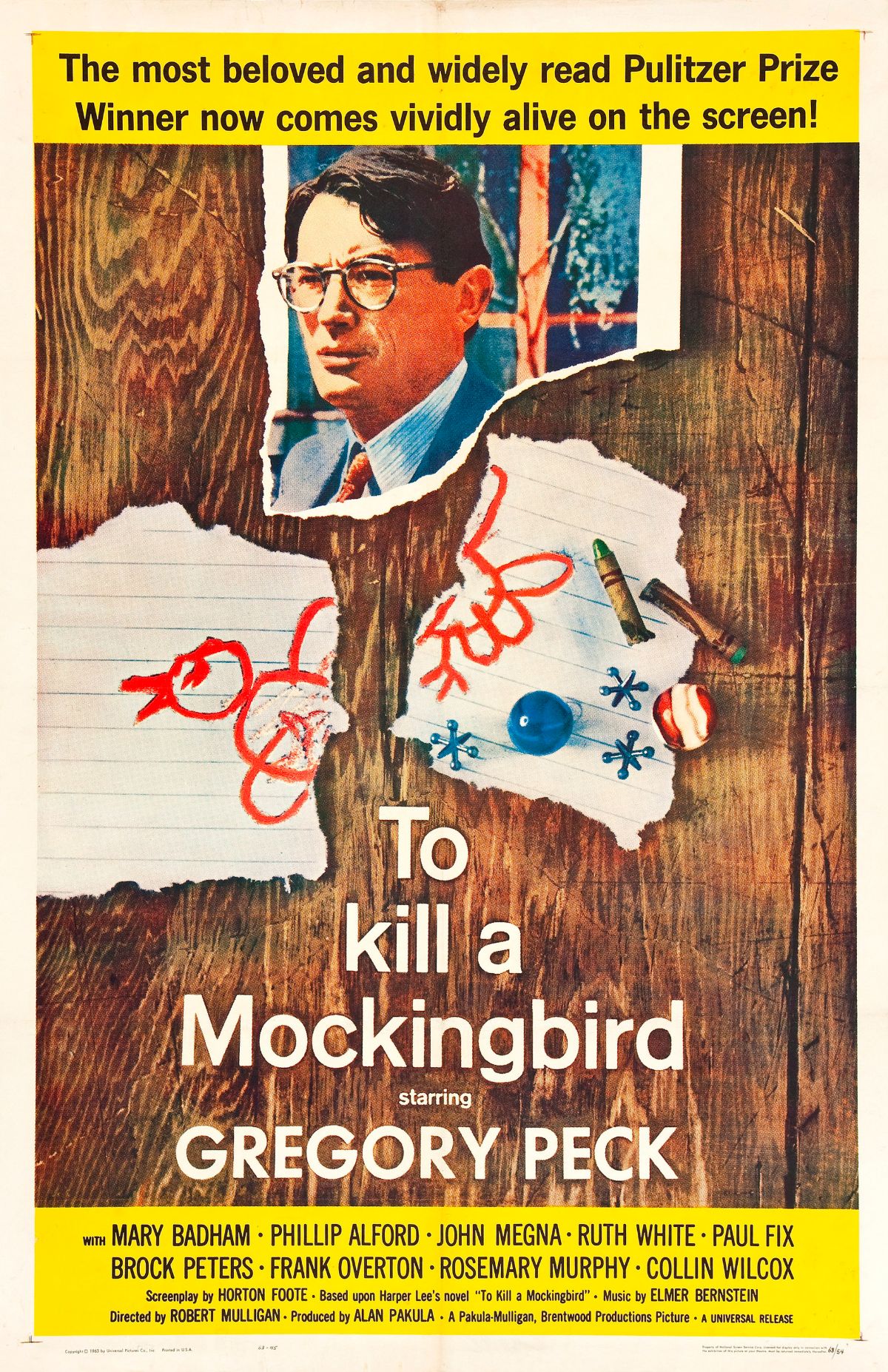
Harper Lee's beloved novel comes to life in the film adaptation of To Kill a Mockingbird, directed by Robert Mulligan. Set in the racially charged American South during the 1930s, the story revolves around a young girl named Scout and her father, Atticus Finch, a lawyer defending a black man accused of raping a white woman.
The film is a poignant exploration of morality, empathy, and the harsh realities of prejudice. Gregory Peck's iconic portrayal of Atticus and the film's timeless themes make To Kill a Mockingbird a cinematic gem that continues to resonate with audiences today.
6. Dr. Strangelove (1964)
This 1964 black comedy explores the absurdity of nuclear war as a group of politicians and military officials try to prevent a nuclear catastrophe. The film's dark humor and memorable characters, including the iconic Dr. Strangelove himself, create a thought-provoking and entertaining experience.
Stanley Kubrick's sharp wit and keen insight into the human condition make Dr. Strangelove a timeless classic that leaves you simultaneously laughing and contemplating the precariousness of global politics.
7. Arsenic and Old Lace (1944)
The charming yet twisted world of Arsenic and Old Lace, directed by Frank Capra, follows Mortimer Brewster, a theater critic who discovers that his lovable old aunts are harboring a dark secret—murder.
The film's delightful mix of humor and macabre elements, coupled with outstanding performances, creates a unique cinematic experience. Capra's direction ensures that the film's eccentric characters and witty dialogue keep you thoroughly entertained as the Brewster family's secrets unravel in hilarious fashion.
8. Psycho (1960)
Alfred Hitchcock's Psycho takes you on a spine-chilling journey into the realm of psychological horror. Released in 1960, this iconic film challenges conventions and introduces Norman Bates, a character who has become synonymous with suspense and terror.
Hitchcock's masterful storytelling and innovative cinematic techniques, especially the infamous shower scene, have left an indelible mark on the thriller genre. Psycho is a gripping exploration of madness, obsession, and the thin line between normalcy and horror that continues to captivate audiences to this day.
9. Some Like It Hot (1959)
Prepare for a rollicking good time with Some Like It Hot, a classic comedy directed by Billy Wilder. Released in 1959, the film follows two musicians who witness a mob hit and disguise themselves as women to escape the gangsters. The plot thickens when they both fall for the band's lead singer, Sugar Kane, played by Marilyn Monroe.
Marilyn Monroe, Tony Curtis, and Jack Lemmon lead a stellar cast, delivering memorable performances in this uproarious tale of mistaken identities and romantic entanglements. Wilder's sharp humor and the cast's comedic chemistry make Some Like It Hot a timeless and enjoyable cinematic experience.
10. Harvey (1950)
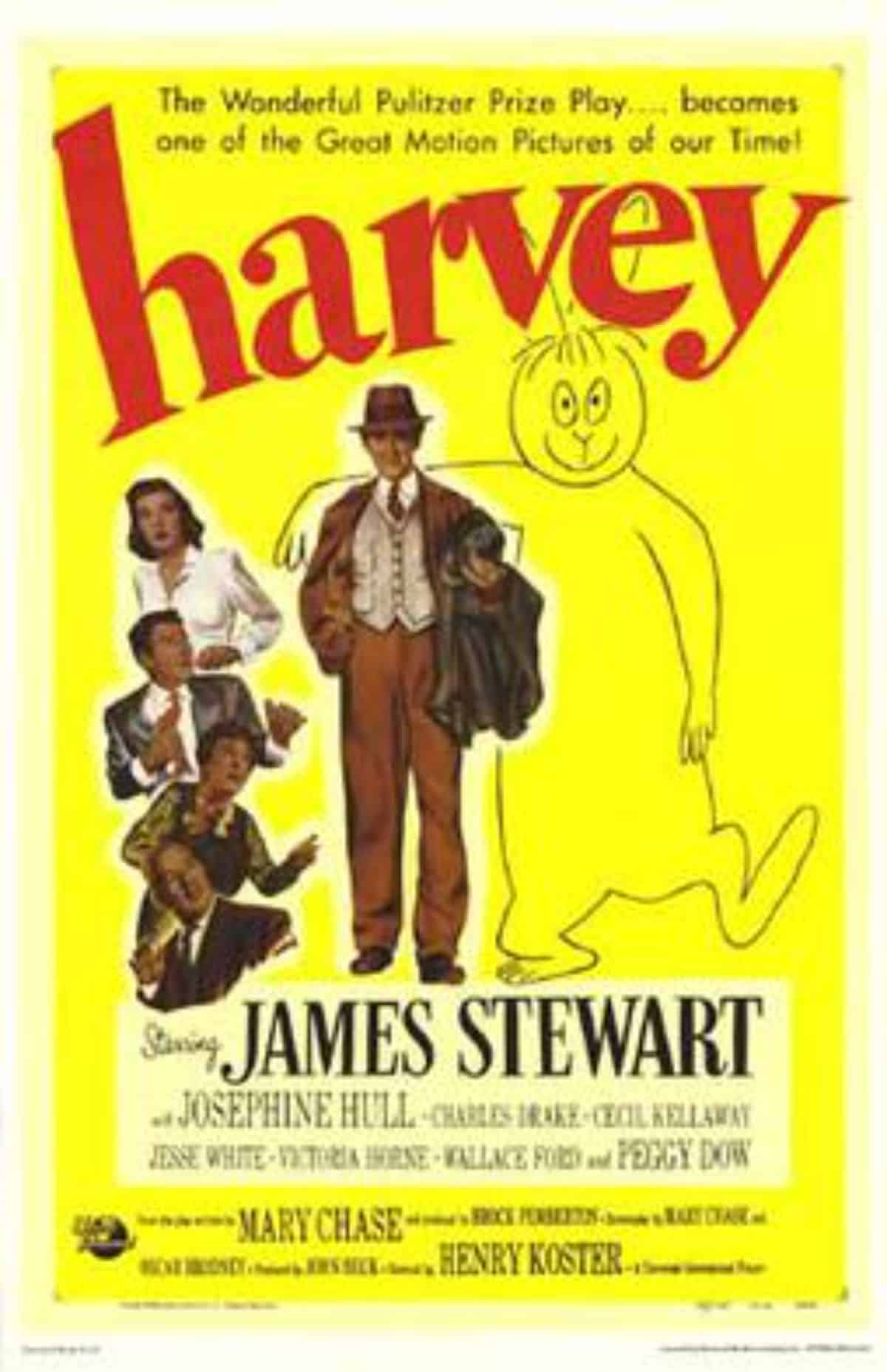
This 1950 classic tells the story of Elwood P. Dowd, a kind and eccentric man whose best friend is an invisible, 6-foot-tall rabbit named Harvey. As Elwood's family tries to have him committed to an asylum, the film becomes a heartwarming exploration of the nature of sanity, friendship, and acceptance.
James Stewart's endearing performance as Elwood and the film's delightful blend of fantasy and philosophy make Harvey a charming and thought-provoking cinematic gem.
11. All About Eve (1950)
Released in 1950 and directed by Joseph L. Mankiewicz, this classic drama unfolds the backstage intrigues and rivalries among theater stars. The film revolves around the ambitious Eve Harrington, who insinuates herself into the life of aging actress Margo Channing.
With its sharp dialogue and stellar performances, particularly by Bette Davis and Anne Baxter, All About Eve is a riveting exploration of ambition, betrayal, and the cost of fame in the world of show business.
12. Roman Holiday (1953)
Gregory Peck portrays an American journalist, and Audrey Hepburn plays Princess Ann, who escapes her royal duties for a day of adventure in William Wyler's Roman Holiday.
The film captures the magic of an unexpected romance against the backdrop of the Eternal City. With its charming leads and captivating storyline, Roman Holiday is a timeless love story that blends humor, elegance, and the joy of discovering life's simple pleasures.
13. Bringing Up Baby (1938)
Directed by Howard Hawks, this 1938 classic stars Cary Grant as a befuddled paleontologist and Katharine Hepburn as a free-spirited heiress. The film takes you on a wild ride as their paths cross, leading to a series of comedic misadventures involving a leopard named Baby.
Bringing Up Baby is a madcap comedy filled with rapid-fire dialogue, slapstick humor, and the undeniable charm of its two iconic leads, making it a timeless and uproarious cinematic experience.
14. The Night of the Hunter (1955)
The chilling depths of suspense and horror in The Night of the Hunter, directed by Charles Laughton, is a force to reckon with. In this 1955 thriller, Robert Mitchum plays a menacing preacher who hunts down two kids in search of stolen goods.
The film's haunting visuals, expressionist cinematography, and Mitchum's menacing performance create an atmosphere of unease and dread. The Night of the Hunter is a masterclass in psychological horror with its stark black-and-white imagery and compelling narrative, leaving an indelible mark on the genre.
15. Sunset Boulevard (1950)
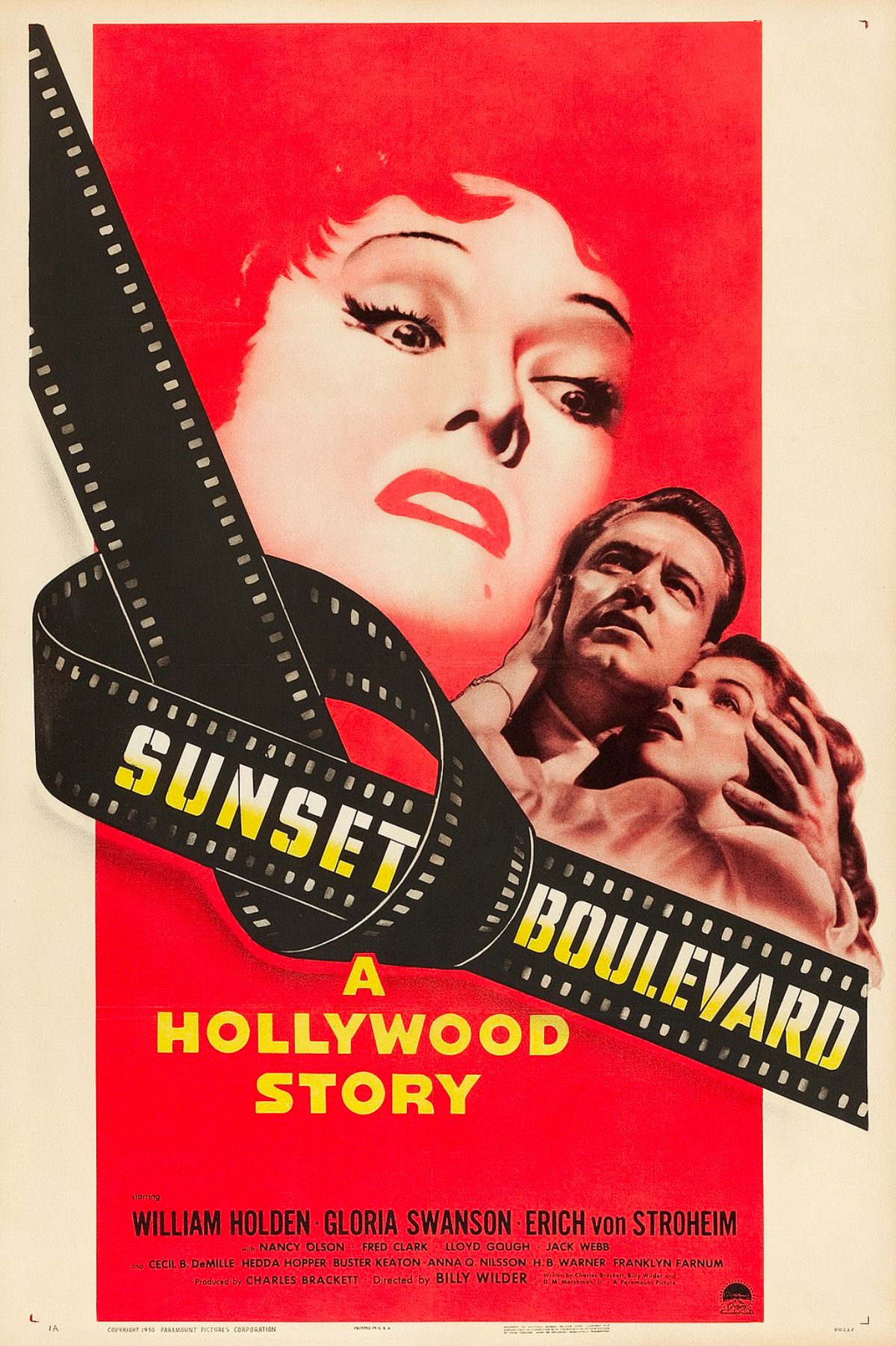
In this 1950 noir movie, Gloria Swanson plays a struggling screenwriter who becomes involved with a former silent film star. The film explores the corrosive effects of Hollywood's obsession with fame and the consequences of living in the past.
With its sharp writing, compelling performances, and memorable opening line, Sunset Boulevard remains a classic exploration of the price of stardom and the illusions of Tinseltown.
16. Gaslight (1944)
Ingrid Bergman's character, Paula Alquist, marries Charles Boyer's character, Gregory Anton, in this 1944 George Cukor psychological thriller.
Settling into a London townhouse, strange occurrences begin, making Paula question her sanity. Unbeknownst to her, Gregory is manipulating events to convince Paula that she is going insane, all while searching for hidden jewels in the house. A tense battle of wits ensues as Paula struggles to uncover the truth and escape the gaslighting manipulation of her husband.
17. The Day The Earth Stood Still (1951)
Released in 1951 and directed by Robert Wise, The Day The Earth Stood Still is a groundbreaking science fiction film. An alien visitor named Klaatu arrives on Earth with a powerful robot, Gort, to deliver a crucial message about humanity's destructive nature.
As governments and military forces react with fear and aggression, Klaatu's mission becomes a race against time to prevent a global catastrophe. The film explores themes of peace, cooperation, and the consequences of unchecked aggression in the face of the unknown.
18. Casablanca (1942)
Set against the backdrop of World War II, Casablanca, directed by Michael Curtiz, is a timeless romantic drama. The story revolves around Rick Blaine, played by Humphrey Bogart, who runs a nightclub in Casablanca. When his former lover, Ilsa Lund (Ingrid Bergman), re-enters his life with her husband, Rick is faced with difficult choices.
The film's iconic quotes, memorable characters, and the romantic allure of As Time Goes By make Casablanca a cinematic masterpiece that continues to resonate with audiences.
19. Metropolis (1927)
Metropolis is a groundbreaking silent science fiction film that Fritz Lang directed and released in 1927. Set in a dystopian future, the film explores the stark divide between the wealthy elite who live in luxury above ground and the oppressed workers toiling in harsh conditions below.
The narrative follows the son of the city's ruler, who discovers the plight of the workers and seeks to bridge the gap. Metropolis is celebrated for its stunning visual effects, elaborate set design, and influence on the science fiction genre.
20. Modern Times (1936)
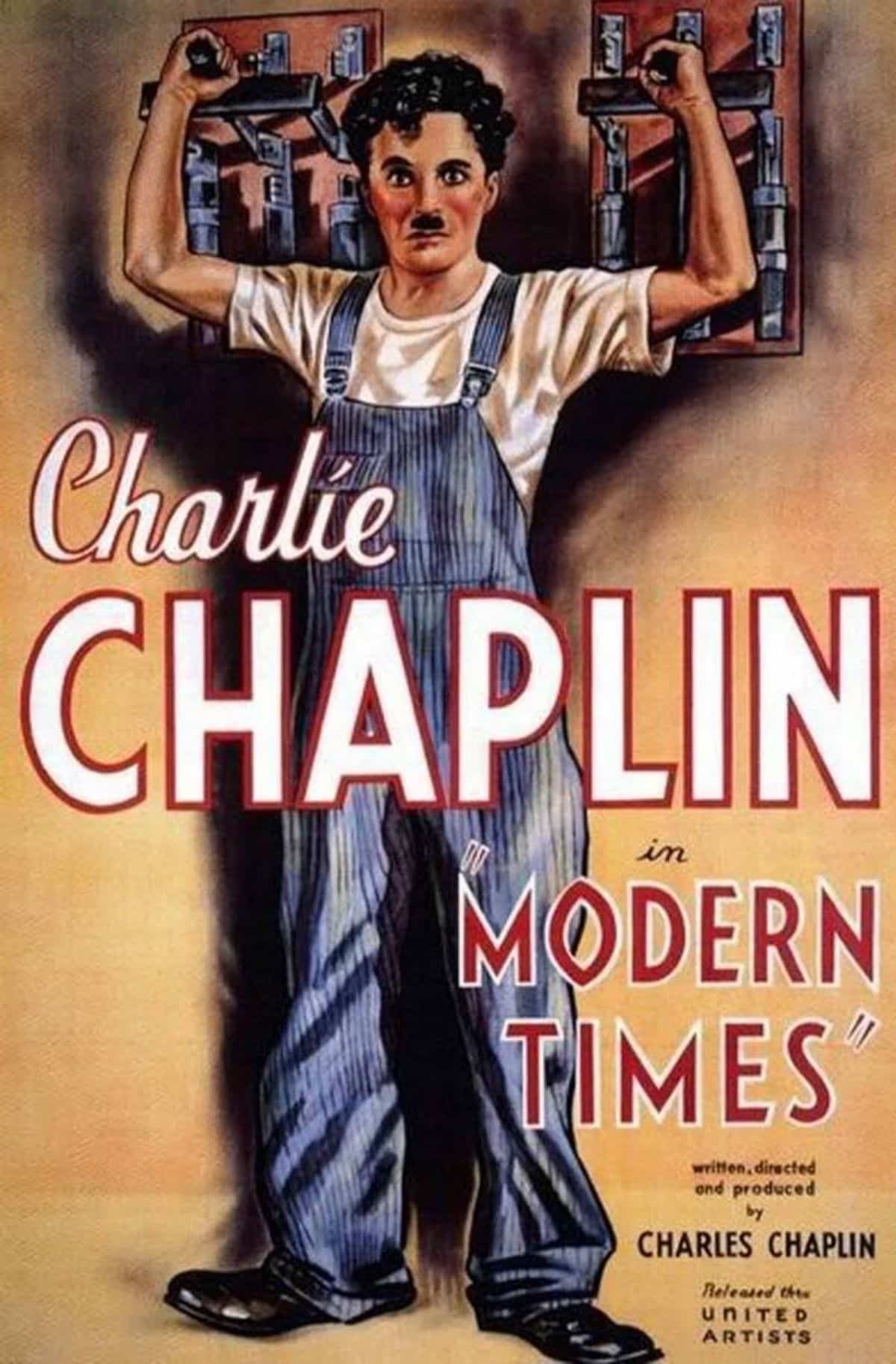
Charlie Chaplin's Modern Times, released in 1936, is a classic silent comedy that satirizes the dehumanizing effects of industrialization and modernity. Chaplin's iconic character, the Tramp, struggles to adapt to the fast-paced, mechanized world.
The film's humor arises from his various misadventures, including working on an assembly line and navigating the challenges of modern life. Beyond its comedic elements, Modern Times also serves as a poignant commentary on the impact of technological progress on society and the individual.
21. Schindler’s List (1993)
Directed by Steven Spielberg and released in 1993, Schindler’s List is a powerful historical drama based on the true story of Oskar Schindler.
During World War II, Schindler, a German businessman, saved the lives of over a thousand Polish Jews by employing them in his enamelware and ammunition factories. The film chronicles the horrors of the Holocaust, capturing the atrocities committed by the Nazis and the profound impact of one man's compassion amid the darkest of times.
22. Clerks (1994)
Kevin Smith's 1994 debut film, Clerks, offers a comedic glimpse into the lives of two store clerks, Dante and Randal, as they navigate a day filled with eccentric customers and existential conversations.
Shot on a shoestring budget in black and white, the film captures the essence of the slacker culture of the 1990s. With its witty dialogue and unapologetic humor, Clerks became a cult classic and established Kevin Smith as a distinctive voice in independent cinema.
23. It’s a Wonderful Life (1946)
This timeless classic by Frank Capra tells the heartwarming story of George Bailey, played by James Stewart. On the brink of despair, George is visited by his guardian angel, Clarence, who shows him what life would have been like if he had never existed.
The film explores themes of sacrifice, community, and the impact of one individual on the lives of many. It's a Wonderful Life has become a beloved holiday tradition, celebrated for its uplifting message and enduring charm.
24. Night of the Living Dead (1968)
Released in 1968, Night of the Living Dead by George A. Romero is a groundbreaking horror film that pioneered the zombie genre. A disparate group of people takes refuge in an isolated farmhouse as the dead inexplicably return to life and hunger for human flesh.
The film is not only a terrifying tale of survival but also a social commentary on the turbulent 1960s. Night of the Living Dead is a horror classic that has influenced countless films in the zombie genre and beyond.
25. The Artist (2011)
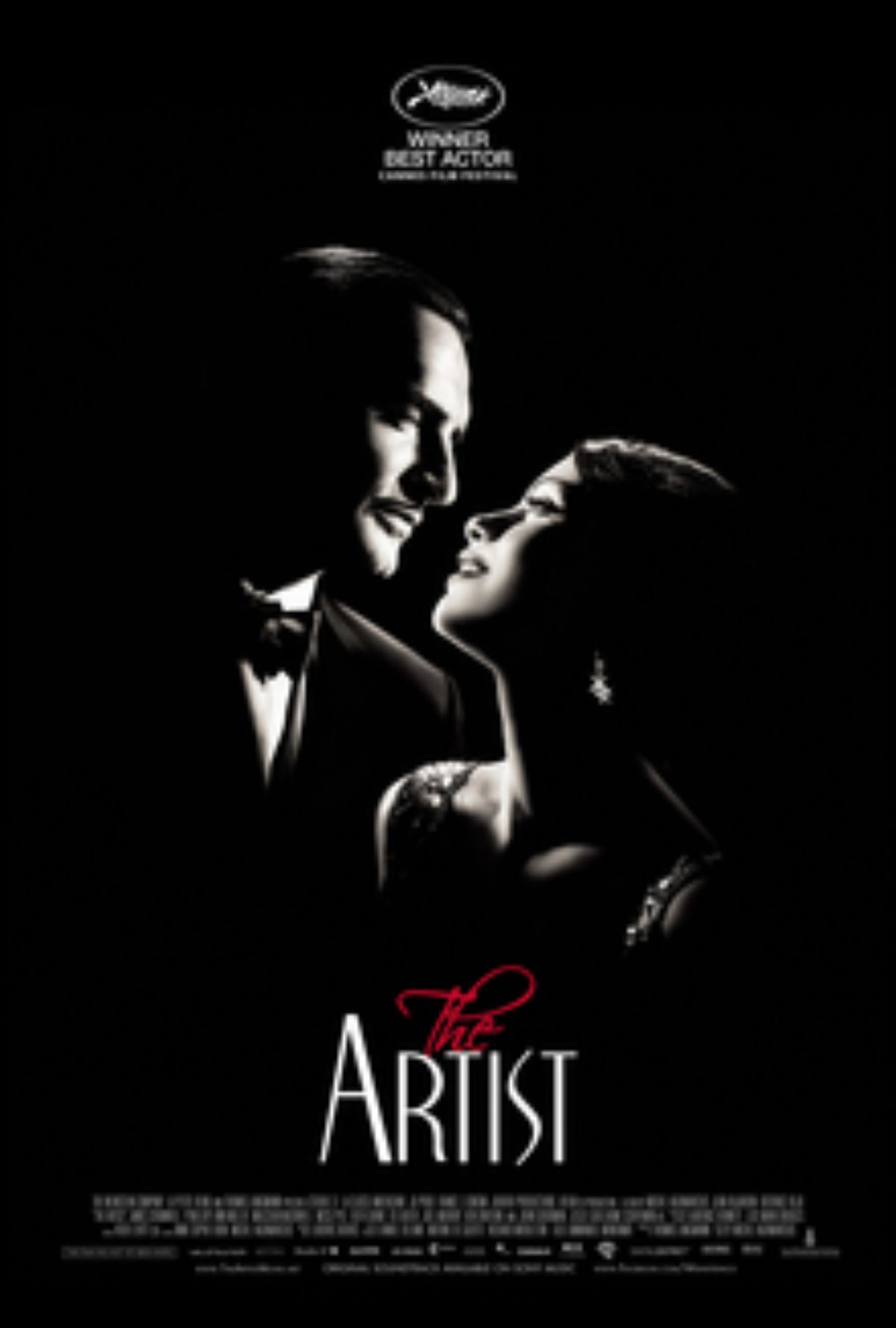
Michel Hazanavicius's The Artist is a modern silent film released in 2011. Set in Hollywood between the late 1920s and early 1930s, the film follows the story of George Valentin, a silent film star facing obsolescence with the advent of talkies.
The film is a love letter to the silent era of cinema, featuring stunning black-and-white cinematography, a captivating narrative, and a standout performance by Jean Dujardin.
26. The Maltese Falcon (1941)
The Maltese Falcon is a classic film noir based on Dashiell Hammett's novel. Humphrey Bogart stars as private detective Sam Spade, drawn into a web of intrigue and murder surrounding a valuable statuette. The film's intricate plot, memorable characters, and Bogart's iconic performance have cemented The Maltese Falcon as a quintessential example of the noir genre.
27. To Have and Have Not (1944)
To Have and Have Not is a romantic adventure film starring Humphrey Bogart and Lauren Bacall. Loosely based on Ernest Hemingway's novel, the film follows the reluctant involvement of a fishing boat captain, Harry Morgan, in the French Resistance during World War II. The on-screen chemistry between Bogart and Bacall adds a layer of charm to this wartime classic.
28. Singin' in the Rain (1952)
In 1952, Stanley Donen and Gene Kelly released the upbeat musical Singin' in the Rain. Set during the transition from silent films to talkies, the film follows the romantic and comedic exploits of Don Lockwood, played by Gene Kelly. Filled with memorable songs, dazzling dance numbers, and a good dose of humor, Singin' in the Rain remains a beloved classic.
29. The Apartment (1960)
The Apartment is a classic romantic comedy-drama following C.C. Baxter, played by Jack Lemmon, as he lends his apartment to his superiors for their extramarital affairs. Complications arise when Baxter falls for Fran Kubelik, played by Shirley MacLaine, who is romantically involved with one of the executives.
The Apartment masterfully blends humor and heart, earning it critical acclaim and several Academy Awards, including Best Picture.
30. Citizen Kane (1941)
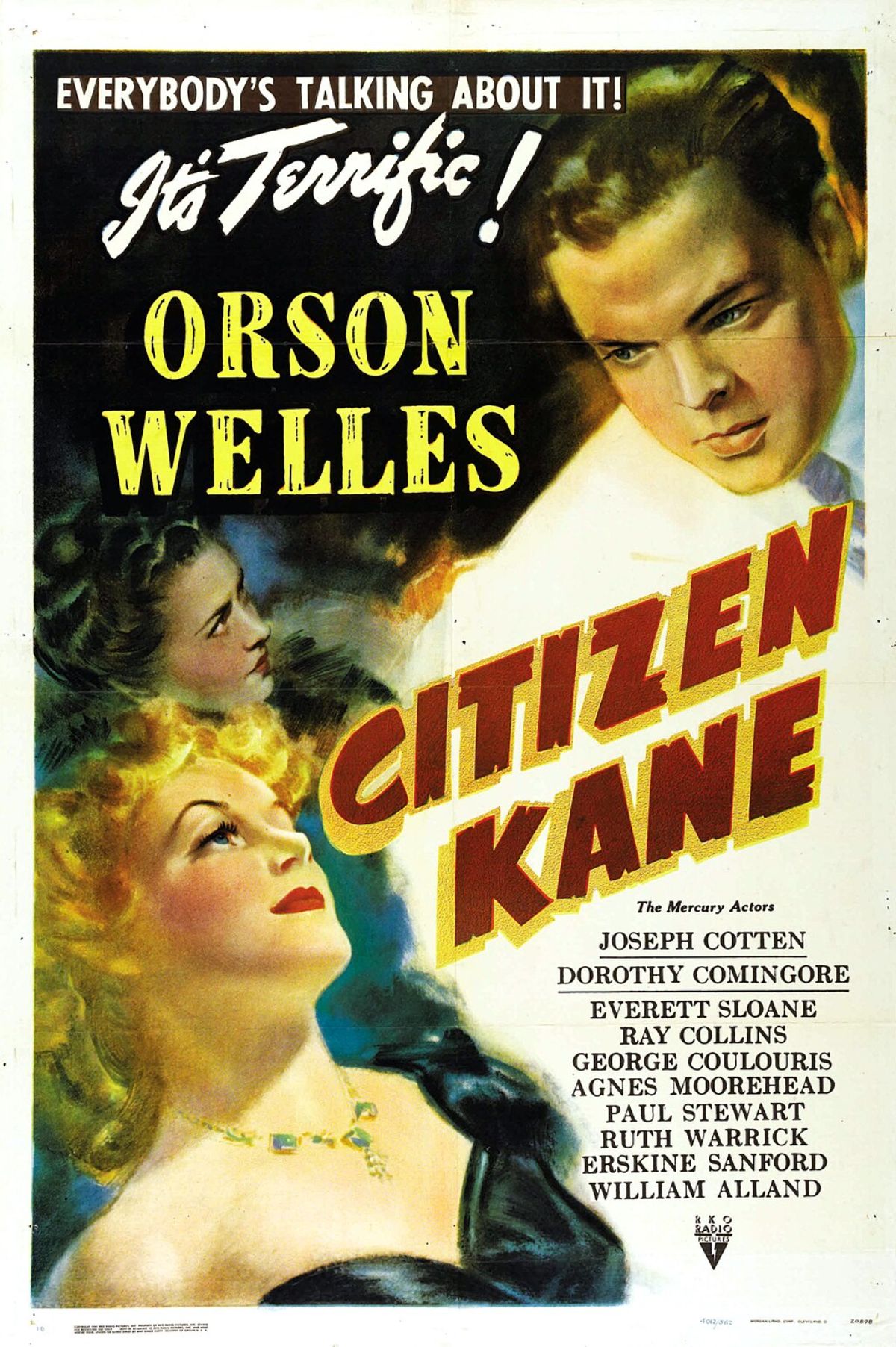
Orson Welles' groundbreaking film Citizen Kane is often regarded as one of the greatest films of all time. The story unfolds as a reporter investigates the life of Charles Foster Kane, a wealthy newspaper magnate, to uncover the meaning behind his enigmatic dying word, "Rosebud."
Known for its innovative narrative structure, deep symbolism, and Welles' remarkable performance, Citizen Kane is a cinematic masterpiece that revolutionized filmmaking.
31. Paper Moon (1973)
The Great Depression serves as the backdrop for Peter Bogdanovich's comedic drama Paper Moon. The film stars Ryan O'Neal as a con artist and his real-life daughter Tatum O'Neal as a clever and resourceful girl who may or may not be his daughter.
Together, they embark on a road trip filled with scams and unexpected bonding, creating a heartwarming yet humorous exploration of love, family, and survival.
32. The Great Dictator (1940)
Charlie Chaplin's The Great Dictator is a satirical masterpiece. In a dual role, Chaplin plays both a Jewish barber and Adenoid Hynkel, a thinly veiled parody of Adolf Hitler. The film cleverly satirizes fascism, racism, and the folly of war. Chaplin's poignant final speech, a plea for peace and humanity, remains one of the most iconic moments in cinematic history.
33. All Quiet on the Western Front (1930)
Based on Erich Maria Remarque's novel, All Quiet on the Western Front is a 1930 war film directed by Lewis Milestone. Set during World War I, the movie follows a group of German schoolboys who eagerly enlist in the army, only to face the harsh realities of war.
The film is celebrated for its realistic portrayal of the horrors of combat and the toll it takes on soldiers' humanity. All Quiet on the Western Front received critical acclaim and won the Academy Award for Best Picture.
34. Philadelphia Story (1940)
Directed by George Cukor and released in 1940, The Philadelphia Story is a romantic comedy starring Katharine Hepburn, Cary Grant, and James Stewart.
The film follows the wealthy Tracy Lord as she prepares for her second marriage. The arrival of her ex-husband (Grant) and a journalist (Stewart) adds unexpected twists, exploring themes of love, class, and self-discovery with wit and sophistication.
35. The Elephant Man (1980)
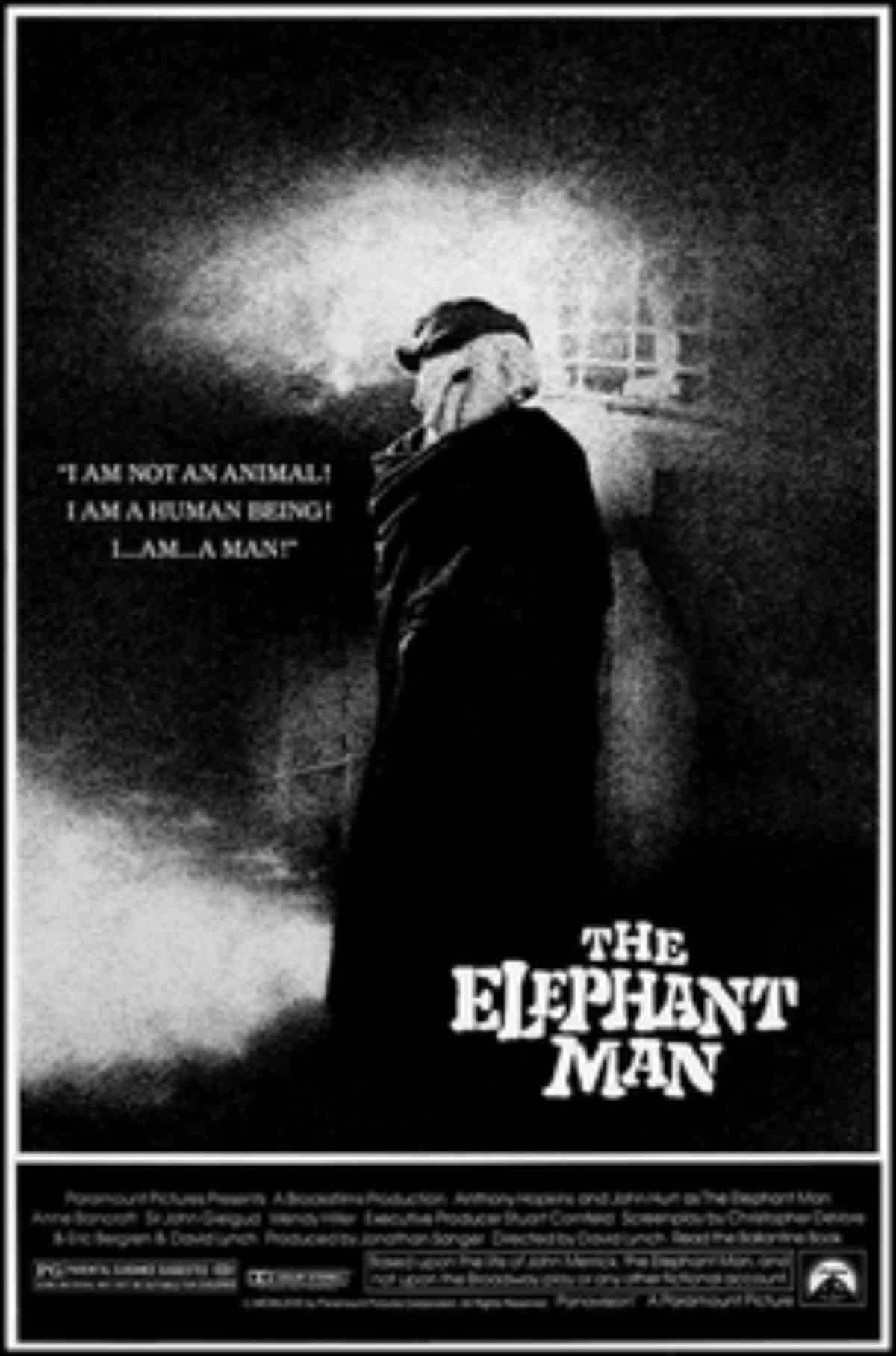
The Elephant Man is a biographical drama based on the life of Joseph Merrick. John Hurt delivers a powerful performance as Merrick, a severely disfigured man living in Victorian London.
The film explores themes of humanity, compassion, and society's treatment of those who are different. Lynch's sensitive direction and exceptional performances make The Elephant Man a poignant and thought-provoking cinematic experience.
36. Gojira (1954)
Directed by Ishirō Honda, Gojira (Godzilla) is a landmark Japanese monster film. Born from the fear of nuclear weapons, Godzilla is awakened and wreaks havoc on Tokyo. The film is not only a thrilling monster movie but also a powerful metaphor for the consequences of nuclear warfare. Gojira became a cultural phenomenon, giving birth to one of cinema's most iconic monsters.
37. Nosferatu (1922)
Nosferatu is a classic horror film released in 1922. An unauthorized adaptation of Bram Stoker's Dracula, the film introduces the iconic vampire Count Orlok, played by Max Schreck. Murnau's expressionistic direction and Schreck's eerie performance contribute to the film's lasting influence on the horror genre, establishing it as a silent cinema masterpiece.
38. Grapes of Wrath (1940)
The Grapes of Wrath is a moving drama that John Ford directed and was based on John Steinbeck's book. The film follows the Joad family as they migrate to California in search of a better life. It explores the hardships faced by the working class and the impact of economic and environmental crises.
The Grapes of Wrath is a powerful depiction of resilience, community, and the human spirit in the face of adversity.
39. It Happened One Night (1934)
It Happened One Night is a classic romantic comedy released in the 1930s. The film follows the unlikely pairing of a spoiled heiress, Ellie Andrews, played by Claudette Colbert, and a witty reporter, Peter Warne, played by Clark Gable, as they embark on a cross-country journey.
This screwball comedy not only established the "road trip" genre but also earned Oscars for Best Picture, Best Director, Best Actor, Best Actress, and Best Adapted Screenplay.
40. Duck Soup (1933)
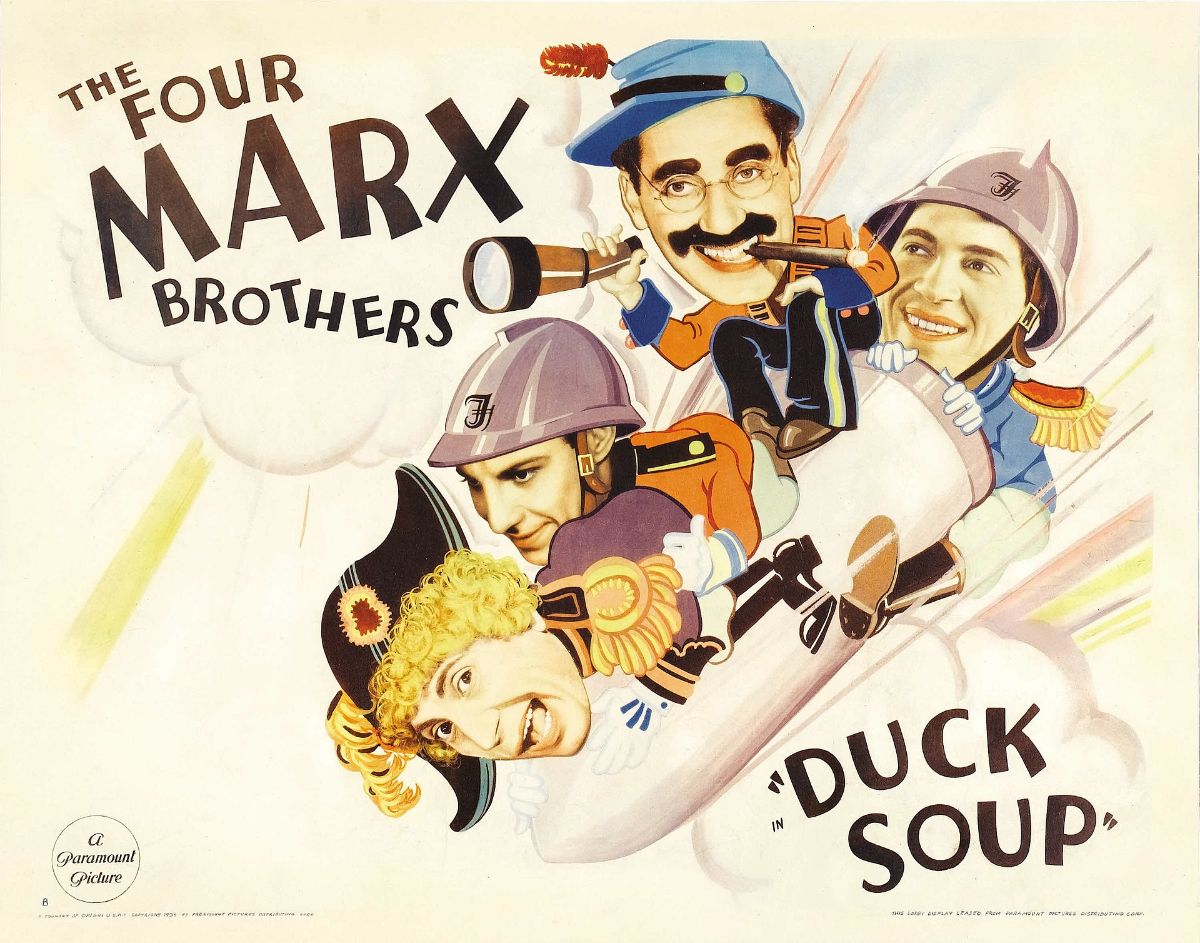
Duck Soup is a well-known Marx Brothers comedy that Leo McCarey directed and debuted in 1933. Groucho, Harpo, Chico, and Zeppo Marx star in this anarchic satire, where Groucho plays Rufus T. Firefly, the leader of the fictional country of Freedonia. The film lampoons politics and war, showcasing the Marx Brothers' trademark humor and zany antics.
41. La Haine (1995)
La Haine is a gritty French drama released in 1995. The film follows three friends from the Parisian suburbs in the aftermath of a riot. As they navigate the challenges of their environment, the film explores themes of social inequality, police brutality, and the cycle of violence. La Haine is renowned for its raw and unflinching portrayal of urban unrest.
42. Mr. Smith Goes to Washington (1939)
Directed by Frank Capra, Mr. Smith Goes to Washington is a classic political movie. James Stewart stars as Jefferson Smith, an idealistic and naive man appointed to the U.S. Senate.
When he discovers corruption in the political system, he takes a stand against it, leading to a filibuster that captures the nation's attention. The film explores themes of integrity, civic duty, and the power of the individual in the face of corruption.
43. The Seventh Seal (1957)
The Seventh Seal is a Swedish film released in 1957. Set during the Black Death, a knight named Antonius Block plays a game of chess with Death while contemplating life, faith, and the meaning of existence. Bergman's film is a profound examination of mortality and the quest for meaning in a world filled with suffering.
44. The Lighthouse (2019)
Robert Eggers' psychological horror film The Lighthouse was released in 2019. Set in the late 19th century, the film follows two lighthouse keepers, played by Willem Dafoe and Robert Pattinson, who descend into madness as isolation, supernatural occurrences, and their own personal demons take hold.
The Lighthouse is known for its atmospheric cinematography, intense performances, and its descent into surreal and nightmarish territory.
45. Roma (2018)
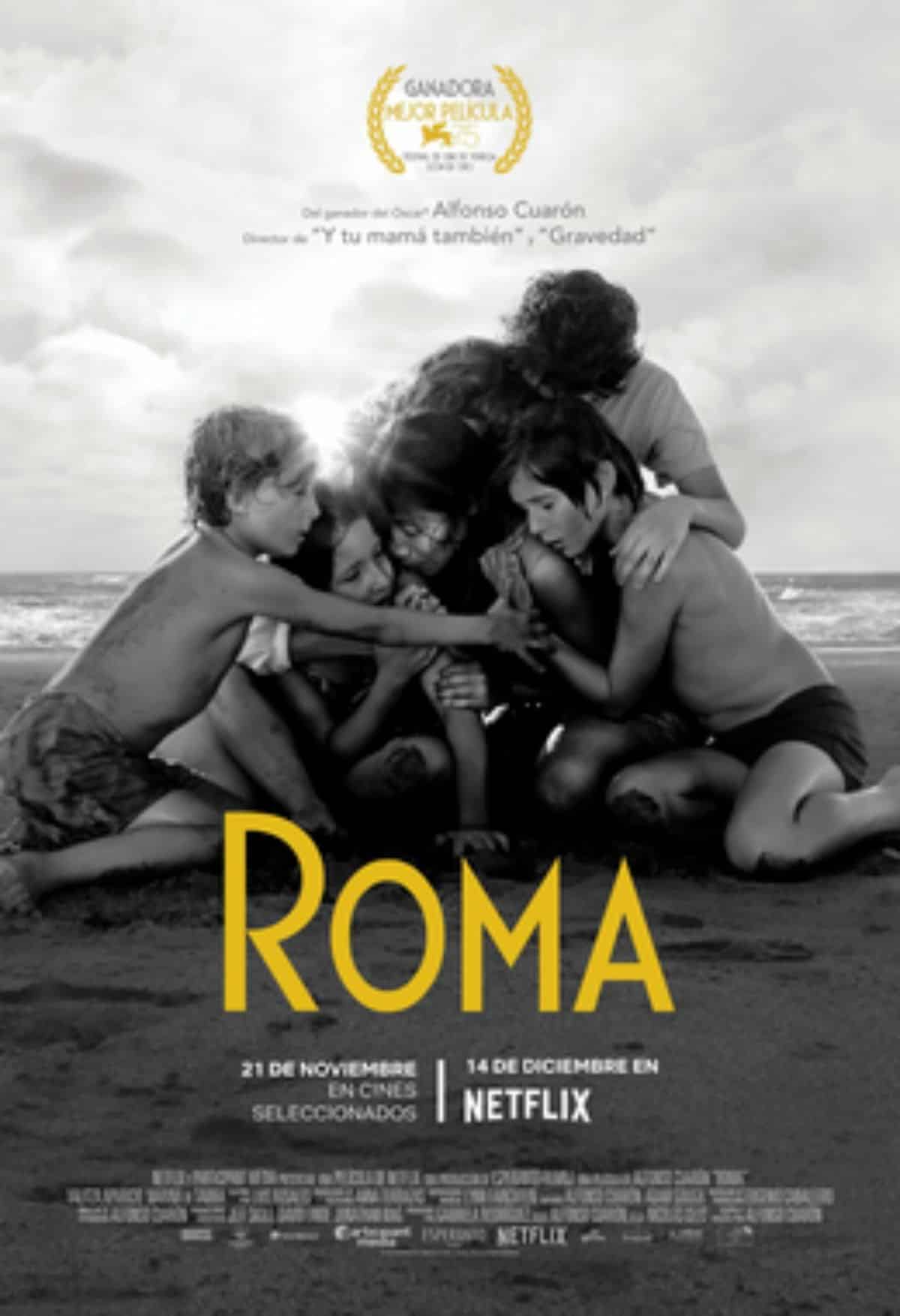
Roma is a critically acclaimed Mexican drama released in 2018. The film is a semi-autobiographical account of Cuarón's upbringing in Mexico City during the early 1970s.
It follows the life of Cleo, a domestic worker, against the backdrop of political and social turmoil. Roma is celebrated for its exquisite black-and-white cinematography and its intimate portrayal of personal and political upheaval.
46. The Tragedy of Macbeth (2021)
Joel Coen’s The Tragedy of Macbeth is a 2021 adaptation of William Shakespeare's play. Starring Denzel Washington as Macbeth and Frances McDormand as Lady Macbeth, the film presents a visually stunning and atmospheric interpretation of the timeless tragedy. Coen's unique approach brings a fresh perspective to the classic tale of ambition and power.
47. Belfast (2021)
Belfast is a 2021 drama set in the Northern Irish capital during the tumultuous late 1960s. The film follows a young boy named Buddy as he navigates the challenges of growing up amid political and social unrest. Belfast is a heartfelt and nostalgic exploration of family, community, and the impact of historical events on individual lives.
48. Sin City (2005)
Sin City is a neo-noir crime anthology based on Miller's graphic novels. The film weaves multiple dark and interconnected tales set in Basin City, featuring a star-studded cast. With its striking visual style that brings comic book pages to life, Sin City immerses viewers in a gritty, violent, and stylized world of crime, corruption, and revenge.
